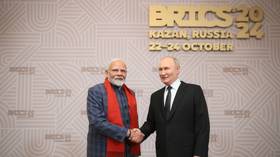Gulf AI giant moves into US amid tech rivalry – FT — RT Business News

The UAE-backed G42 group’s reported expansion plans come amid growing AI competition, with China and others closing the gap with the US
The United Arab Emirates’ artificial intelligence group G42, backed by Abu Dhabi’s state-owned Mubadala investment company, is set to expand into the US, Financial Times has reported, citing corporate filings. It plans to invest tens of billions of dollars to establish itself in the market, the newspaper said.
While the US has dominated the domain, as well as the semiconductor segment, more and more nations are making concerted efforts to develop and promote globally indigenous AI technologies and chips.
In an article on Sunday, FT quoted a G42 representative as confirming that it is “committed to the USA market expansion and has established a legal entity towards that strategy.”
The publication noted that the AI company is chaired by the UAE’s national security adviser Sheikh Tahnoon bin Zayed al-Nahyan, who has spearheaded the country’s AI-centered economic diversification push.
Last April, Microsoft pledged to invest $1.5 billion into G42 in exchange for a minority stake in the UAE group, which has also attracted other US investors, including Ray Dalio’s family office and private equity firm Silver Lake.
In 2023, G42 announced it was cutting ties with Chinese hardware suppliers such as Huawei in favor of their American competitors to ensure compliance with US regulations.
As recently as January, the debut of DeepSeek in China cast doubt on the dominance of US-based ChatGPT. Unlike its American rival, the Chinese model is freely available without a subscription, and swiftly became the most downloaded app on Apple’s and Google’s stores in nearly 60 countries. On top of that, it is said to be far less expensive to run compared to ChatGPT.
Back in March, researchers from the University of Science and Technology of China (USTC) unveiled a new superconducting quantum computing prototype, which is said to be a million times faster than Google’s top quantum processors. The Chinese chip, named Zuchongzhi-3, is also a quadrillion times more efficient than any conventionally built supercomputer, according to its developers.
In February, the newspaper Mint, citing Indian officials, claimed that New Delhi was developing its own artificial intelligence chip from scratch, with a view to reducing the country’s dependence on Western tech companies by 2027.



